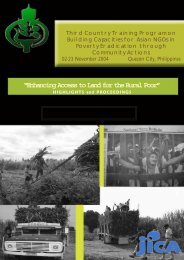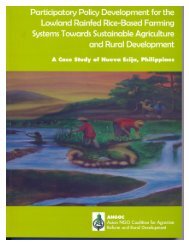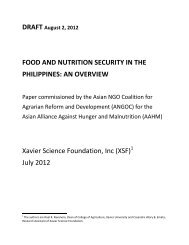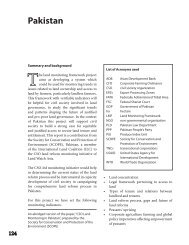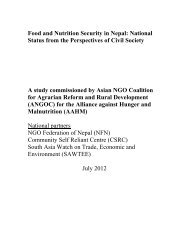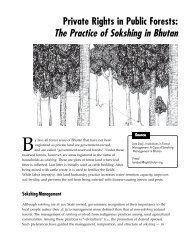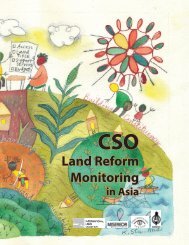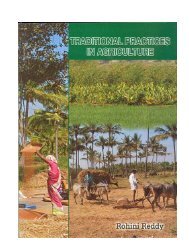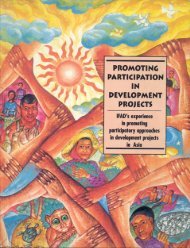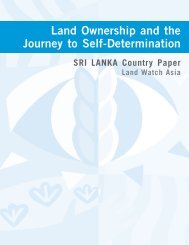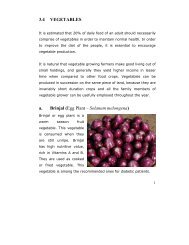Securing the Right to Land FULL - ANGOC
Securing the Right to Land FULL - ANGOC
Securing the Right to Land FULL - ANGOC
You also want an ePaper? Increase the reach of your titles
YUMPU automatically turns print PDFs into web optimized ePapers that Google loves.
SECURING THE RIGHT TO LAND126<br />
subsidiary interventions should be made, but only <strong>the</strong> primary<br />
ones are presented as follows.<br />
1. Inclusive Policy Formulation and Implementation<br />
Current land-related acts and policies need <strong>to</strong> be repealed<br />
and new ones formulated on behalf of landless, poor tenant<br />
farmers. Most important of all, <strong>the</strong> Constitution should<br />
guarantee implementation of land reform. The success of<br />
land reform in West Bengal, India was due <strong>to</strong> <strong>the</strong> implementation<br />
of progressive land policies as dictated by <strong>the</strong><br />
country’s constitution.<br />
2. Restructuring of <strong>Land</strong> Administration<br />
In Nepal, land management is highly centralized. Although<br />
<strong>the</strong> Ministry of <strong>Land</strong> Reform and Management has extended<br />
units across <strong>the</strong> country, <strong>the</strong>se do not have power <strong>to</strong> settle<br />
issues concerning land at <strong>the</strong> local level. All decisions related<br />
<strong>to</strong> land management are made at <strong>the</strong> Ministry level.<br />
Unfortunately, poor people cannot afford even <strong>the</strong> cost of<br />
travelling <strong>to</strong> <strong>the</strong> Ministry. Besides, land administration is<br />
marred by procedural complexities and duplicities, which<br />
<strong>the</strong> poor are unable <strong>to</strong> deal with. Thus, <strong>the</strong>re is an urgent<br />
need <strong>to</strong> simplify and decentralize land administration. The<br />
authority over land reform and administration should be<br />
delegated <strong>to</strong> District Development Committees (DDCs) and<br />
Village Development Committees (VDCs), with <strong>the</strong> District<br />
<strong>Land</strong> Reform Office (DLRO) serving as secretariat <strong>to</strong> <strong>the</strong>se<br />
units. A separate land court at <strong>the</strong> VDC and DDC levels should<br />
be established <strong>to</strong> expedite <strong>the</strong> settlement of land issues concerning<br />
poor people. The court at <strong>the</strong> district level should be<br />
given as much authority as <strong>the</strong> Appelate Court, in regard <strong>to</strong><br />
resolving land disputes.<br />
3. Establishment of a High-Level <strong>Land</strong> Authority<br />
A high-level authority needs <strong>to</strong> be created <strong>to</strong> look in<strong>to</strong> <strong>the</strong><br />
claims and data of <strong>the</strong> state, real life problems facing <strong>the</strong><br />
people in relation <strong>to</strong> land, and ways <strong>to</strong> address problems.<br />
Such an authority should be independent of vested interests,<br />
with experts in <strong>the</strong> field and representatives of <strong>the</strong><br />
poor and marginalized, including women, Dalits, Madeshis,<br />
Haliyas and Haruwas. The authority should have its offices<br />
expanded from <strong>the</strong> central down <strong>to</strong> VDC levels, with a clear,<br />
written mandate at each level. The central committee of<br />
this high-level body should concern itself only with technical<br />
and advisory matters, while <strong>the</strong> VDC and district level<br />
committees should have <strong>the</strong> power <strong>to</strong> recommend concrete<br />
actions. The success of land reform in Japan, Taiwan and<br />
South Korea depended on <strong>the</strong> power and authority of local<br />
level committees.<br />
4. Educating and Organizing <strong>Land</strong>less and Poor People<br />
No changes occur at <strong>the</strong> high level without constant pressure<br />
from below. This is as true in Nepal as everywhere else.<br />
As long as <strong>the</strong> poor remain unorganized, <strong>the</strong> elite will continue<br />
<strong>to</strong> keep <strong>the</strong>m under feudal, semi-feudal, bondage and<br />
exploitative systems. The victims should <strong>the</strong>refore be organized,<br />
made aware of <strong>the</strong>ir situation, and mobilized against<br />
<strong>the</strong>ir ongoing deprivation and oppression. The oppressed and<br />
exploited should be made aware that <strong>the</strong>y have <strong>the</strong> right <strong>to</strong><br />
peaceful resistance against suffering and oppression.<br />
Awareness gives <strong>the</strong>m <strong>the</strong> power <strong>to</strong> fight oppression. Organization<br />
makes <strong>the</strong> fight constructive and logical. There is<br />
<strong>the</strong>refore a need <strong>to</strong> invest in organizing and educating <strong>the</strong><br />
landless and <strong>the</strong> poor.<br />
5. Budget Allocation for Comprehensive <strong>Land</strong> Reform and<br />
Agriculture Sec<strong>to</strong>r<br />
The Government of Nepal collects billion of rupees as tax<br />
from land transactions, yet hardly 10% of <strong>the</strong> revenues<br />
from land taxes is invested in land management issues.<br />
There are hardly any efforts <strong>to</strong> enhance land productivity.<br />
As a result, land productivity is decreasing as is <strong>the</strong> contribution<br />
of agriculture <strong>to</strong> <strong>the</strong> country’s Gross Domestic Product<br />
(GDP). However, efforts <strong>to</strong> enhance agricultural<br />
productivity should follow, not precede, a progressive<br />
land reform program. The additional budget allocation for<br />
agriculture would be meaningful only after <strong>the</strong> issue of inequitable<br />
land ownership has been properly addressed.



